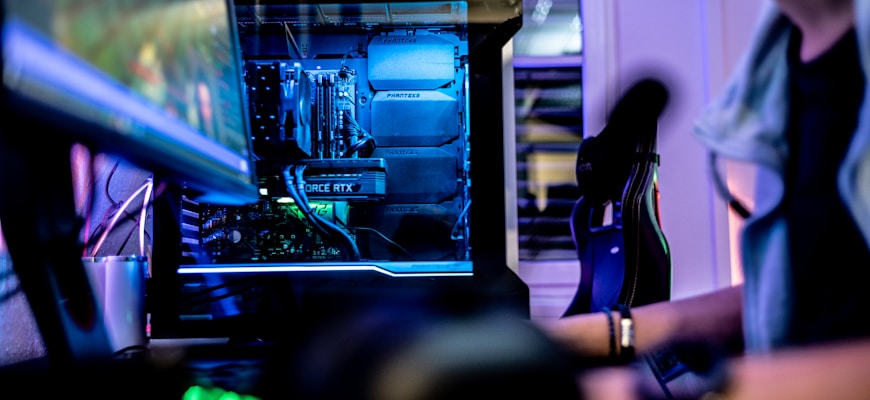How Blockchain Is Disrupting the Gaming Industry

- Revolutionizing In-game Asset Ownership
- Enhancing Security and Transparency in Game Transactions
- Creating New Opportunities for Gamers to Monetize Their Skills
- Facilitating Cross-platform Compatibility and Interoperability
- Increasing Trust and Fairness in Online Gaming
- Challenges and Future Implications of Blockchain in the Gaming Industry
Revolutionizing In-game Asset Ownership
Blockchain technology is transforming the gaming industry by revolutionizing in-game asset ownership. Through the use of blockchain, players can truly own their virtual assets, whether it be weapons, skins, or other items within a game. This ownership is secure and transparent, as blockchain technology ensures that each asset is unique, verifiable, and cannot be duplicated.
One of the key benefits of this revolution is that players can now buy, sell, and trade their in-game assets with other players outside of the game environment. This opens up new opportunities for gamers to monetize their gaming experience and create a real-world value for their virtual possessions. Additionally, blockchain technology allows for the creation of decentralized marketplaces where players can safely and securely exchange assets without the need for intermediaries.
Furthermore, blockchain technology enables the concept of “play-to-earn,” where players can earn rewards in the form of cryptocurrency or other digital assets for their in-game achievements. This incentivizes players to invest more time and effort into gaming, as they can reap tangible rewards for their skills and accomplishments. In this way, blockchain is reshaping the gaming landscape by empowering players and giving them more control over their gaming experience.
Overall, the revolutionizing in-game asset ownership through blockchain technology is bringing a new level of transparency, security, and value to the gaming industry. Players can now truly own and monetize their virtual assets, creating a more immersive and rewarding gaming experience for all involved. As blockchain continues to disrupt the gaming industry, we can expect to see even more innovations and opportunities emerge for players worldwide.
Enhancing Security and Transparency in Game Transactions
Blockchain technology is revolutionizing the gaming industry by enhancing security and transparency in game transactions. By utilizing decentralized ledgers, blockchain ensures that all gaming transactions are secure and tamper-proof. This means that players can trust that their in-game assets and purchases are protected from fraud and hacking.
One of the key benefits of blockchain in gaming is the increased transparency it provides. Every transaction is recorded on the blockchain, creating an immutable record that can be accessed by all parties involved. This transparency helps to build trust between players, developers, and publishers, as everyone can verify the legitimacy of in-game items and transactions.
Furthermore, blockchain technology enables the use of smart contracts in gaming, which are self-executing contracts with the terms of the agreement directly written into the code. This means that payments, rewards, and other transactions can be automated and executed without the need for intermediaries. Smart contracts help to streamline transactions and reduce the risk of fraud or disputes.
Creating New Opportunities for Gamers to Monetize Their Skills
Blockchain technology is opening up new possibilities for gamers to capitalize on their skills and earn money. By leveraging blockchain’s decentralized and transparent nature, gamers can now participate in peer-to-peer transactions without the need for intermediaries. This means that gamers can directly monetize their in-game assets, such as rare items or characters, by selling them to other players for cryptocurrency.
Additionally, blockchain technology enables gamers to participate in skill-based gaming competitions with the potential to win prizes in digital currencies. This creates a level playing field for gamers of all skill levels, as winnings are distributed based on performance rather than luck. As a result, gamers have the opportunity to earn a steady income by honing their skills and competing in various gaming events.
Furthermore, blockchain technology allows gamers to securely trade their virtual assets without the risk of fraud or theft. Each transaction is recorded on a tamper-proof ledger, ensuring that both parties uphold their end of the deal. This increased trust and transparency in the gaming ecosystem not only benefits individual gamers but also promotes a healthier and more sustainable gaming economy overall.
Facilitating Cross-platform Compatibility and Interoperability
One of the key advantages of blockchain technology in the gaming industry is its ability to facilitate cross-platform compatibility and interoperability. This means that games built on blockchain can be accessed and played across different devices and operating systems seamlessly. Players no longer have to worry about being restricted to a single platform or losing their progress when switching devices.
Blockchain enables developers to create games that can be easily ported to various platforms, allowing for a more inclusive gaming experience. This interoperability also opens up new opportunities for cross-platform gameplay and social interactions among players, regardless of the devices they are using. It breaks down the barriers that traditionally exist between different gaming ecosystems, fostering a more connected and collaborative gaming community.
Increasing Trust and Fairness in Online Gaming
The implementation of blockchain technology in online gaming is revolutionizing the industry by increasing trust and fairness among players. Blockchain’s decentralized nature ensures that game outcomes are transparent and cannot be manipulated by any single entity.
Through the use of smart contracts, players can have confidence in the integrity of the gaming process. These contracts automatically execute actions when certain conditions are met, eliminating the need for intermediaries and reducing the risk of fraud.
Furthermore, blockchain technology allows for the creation of unique in-game assets that players truly own. This ownership is secured through cryptographic principles, giving players full control over their virtual items and preventing them from being duplicated or stolen.
By promoting trust and fairness in online gaming, blockchain is reshaping the way players interact with games and each other. This shift towards a more transparent and secure environment is attracting more users to the blockchain gaming space, leading to its rapid growth and widespread adoption.
Challenges and Future Implications of Blockchain in the Gaming Industry
As blockchain technology continues to make waves in the gaming industry, there are several challenges and future implications that need to be considered. One of the main challenges is the scalability of blockchain networks, which can limit the number of transactions that can be processed in a timely manner. This can result in slower gameplay and higher fees for players.
Another challenge is the integration of blockchain technology into existing gaming platforms. Game developers need to invest time and resources into understanding how blockchain works and how it can be implemented effectively. This can be a barrier for smaller game studios with limited budgets.
Looking ahead, the future implications of blockchain in gaming are vast. One of the most exciting prospects is the ability to tokenize in-game assets, allowing players to truly own their digital items. This can create new opportunities for trading and selling virtual goods, as well as fostering a sense of ownership and investment in the gaming experience.
Furthermore, blockchain technology has the potential to revolutionize the way games are monetized. By using smart contracts, developers can create transparent and fair revenue-sharing models that benefit both players and creators. This can help to reduce the prevalence of pay-to-win mechanics and loot boxes, creating a more equitable gaming ecosystem.



